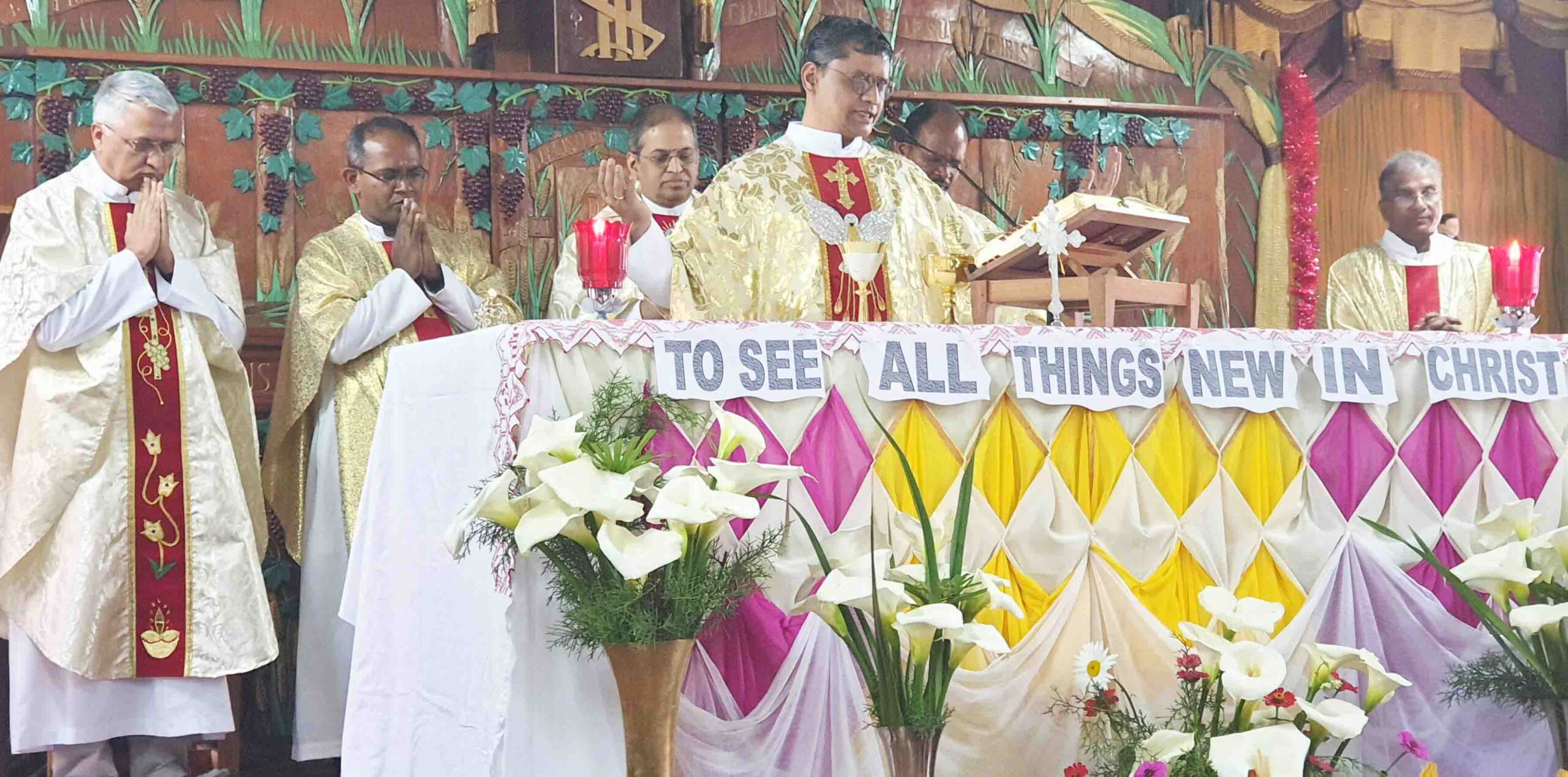This question was asked in the following forms:
- Can the Catholic faithful receive sacraments by a non-Catholic minister?
- If they can receive, are the sacraments equally valid as in the Catholic Church?
- Can all the seven sacraments be received or only some of them?
The answer to these questions is «yes». Provisions of canon 844 of the Code of Canon Law 1983 establishes a norm known as Communicatio in sacris in Latin. Under this provision, the Catholic faithful can lawfully receive some of the sacraments of Eucharist, Penance and Anointing of the sick by a non-Catholic minister only on certain conditions. This article discusses in detail what are those sacraments and the respective conditions attached to them.
The question is very relevant and pertinent to the Catholics living in various circumstances and under various conditions. First of all, we need to know what is sacrament and why they are important for Catholics. It is evident that there are seven sacraments in the Catholic Church:
- Baptism
- Confirmation
- Eucharist
- Penance
- Marriage
- Holy Orders, and
- Anointing of the sick.
This article concerns the above-mentioned sacraments. Who can ordinarily administer them, and who can ordinarily receive them? Who can extraordinarily administer them and who can extraordinarily receive them?
Role of the baptized faithful
The term «sacrament» comes from the Latin substantive «sacer» which means «holy», and the Latin verb «sacrare» which means «to make holy». Hence, «sacrament» would mean – «anything that is holy and that which makes persons holy». We need to know that the Catholic Church has its specific objectives for its members. To be a member of the Catholic Church, one needs to be baptized first. Through the sacrament of baptism, basically three things happen simultaneously (can. 204 §1). First, a person is «incorporated in the Church» [to be embodied in the Church]. Secondly, the person is constituted as «people of God». Third, the person participates in three functions or offices of Christ – namely, in the «priestly» function [to be a priest proper to sanctifying office of Christ], in the «prophetic» function [to be a prophet in the teaching office of Christ], in the «kingly» function [to be a king in the governing office of Christ]. Hence, all the baptized faithful are called to exercise the «mission» which God entrusted them to fulfil in the world. This means that the faithful exercise this mission according to their own canonical condition or canonical state proper to their life – canonical conditions mean as lay faithful, as clergy, as Religious Brothers or Religious Sisters in the Institutes of Consecrated life (ICL). This also includes the life as members of the Societies of Apostolic Life (SAL). In gist, each baptized faithful is obliged exercise the mission of God and to fulfil it to promote the growth of the Church and its continual sanctification (cf. can. 210).
Meaning of the Sacrament in the Church
How do we define a sacrament? In the matter of fact, the Code of Canon Law of the Latin Church does not give a definition of sacrament, because the sacrament may not only include the actual reception of the seven sacraments in the Church, but also to participate in the sanctifying office of the Church by various roles according to one’s canonical condition or state of life. However, we can refer here the classical notion of St. Augustine in his Summa Theologiae: «The Sacrament is visible sign of invisible grace». The Code of Canon Law denotes the notion of «sacrament» in the following words – «The Sacraments in the New Testament are instituted by Christ and they are entrusted to the Church» (cf. can. 840). It further says that the sacraments are «actions of Christ» and «signs and means» by which 3 things take place at the same time:
- Faith is expressed and strengthened,
- Worship is offered to God, and
- Our sanctification is brought about.
The Code of Canon Law further elaborates stating that the sacraments contribute in the most effective manner to establishing, strengthening, and manifesting «ecclesiastical communion». Hence, the Cod of Canon Law further underscores that in the celebration of the sacraments both the sacred ministers and all the other members of Christ’s faithful must show great reverence and due care wherever and whenever possible.
Ordinary and extraordinary ministers of the sacraments
Now, we come to the core of our topic «can Catholic faithful receive sacraments by a non-Catholic minister»? First of all, it is important to note the meaning of the term «minister». «Minister of the sacrament» means the person who is authorized to administer or confer the sacraments on their recipients. Hence, as in the case of the sacrament of Holy Orders in the Catholic Church, the minister of the sacrament of Holy Order is the Bishop who can validly and lawfully ordain a member to the order of deaconate or priesthood.
Secondly, it is also important to note the term «ordinary minister» and «extraordinary minister». Ordinary minister means the person who is authorized to administer the sacrament which is proper to its nature and character by law. While the term «extraordinary minister» would mean the person who can carry out the office of administering the sacrament entailing the same sacramental effect in special cases by law when the «ordinary minister» is unable to present oneself because of certain conditions. For example, the ordinary minister of sacrament of confirmation is the Bishop. But, if the Bishop is unavailable for the same function, he can delegate the parish priest or any other priest to administer the sacrament of confirmation with the faculty lawfully to do so either from the general law or by way of special grant from the competent authority (can. 882). However, the nuance between «Ordinary» and «Extraordinary» minister does not relate to our question of reception of the Sacraments by non-Catholic ministers.
Can Catholics receive the sacraments from a non-Catholic minister?
Ordinarily, according to the norm of the Church, in principle only the Catholic ministers administer the sacraments (all the seven sacraments of the Church) lawfully to Catholic members of Christ’s faithful, who equally may receive them only from Catholic ministers (can. 844 §1). However, there are certain exceptions to this norm for sacrament of Penance, Eucharis and Anointing of the sick. These exceptions are based on the principle given below.
Our question is: «Can the Catholic faithful receive the sacraments from a non-Catholic minister»? To get the answer to this question, we need to be ascertained that under specified and limited conditions, the Catholic faithful can receive only three of the seven sacraments – the sacrament of penance, Eucharist and anointing of the sick – from a non-Catholic minister in a distinct and carefully defined circumstances. The provision of canon 844 §2, §3 and §4 establishes norms which are known as communicatio in sacris in Latin, which means «sharing in the sacred things». We shall discuss the norm of communicatio in sacris in detail under this section.
As stated above, the notion of «sharing in the sacred things» is based on the teaching of the decree Unitatis in redintegratio no. 8 of the Vatican Council II. The Vatican II decree Unitatis redintegratio is about the restoring the Christian unity. However, it must be remembered that any means may not be employed indiscriminately toward restoring Christian unity without principle on Catholic teaching. We have seen above, we understand sacrament as having two fundamental elements – «sign» and «grace». Sharing of the three sacraments is dependent mainly on these two principles, i.e., the unity of the Church as a «sign», and the sharing as the «means of grace».
The sacraments of Penance, Eucharist, and Anointing of the sick can be shared in the following three ways:
- The Catholic faithful can receive these three sacraments lawfully from a non-Catholic minister under specified and limited conditions.
- The Catholic ministers can administer these three sacraments lawfully to the members of the Eastern Churches [e.g., Orthodox churches] which are not in full communion with the Catholic Church.
- The Catholic minsters can administer these three sacraments lawfully to the members of the churches [separated churches from the Latin Church].
1) Catholic faithful can receive the sacraments from a non-Catholic minister
This principle is based on the canonical norm dealt under canon 844 §2. It states whenever necessity requires it or true spiritual advantage suggests, the Catholic faithful can receive the sacraments of Penance, Eucharist and Anointing of the sick from a non-Catholic minister in whose Churches these sacraments are valid. There are four conditions attached to this norm are:
a) There must be a genuine necessity or true spiritual advantage for the Catholic faithful in receiving these three sacraments: All the baptized Catholics faithful are obliged to participate in the Holy Eucharist and observe the primary holyday of obligation – the Nativity of Our Lord Jesus Christ, the Epiphany, the Ascension of Christ, the feast of the Body and Blood of Christ, the feast of Mary the Mother of God, her Immaculate conception, her Assumption, the feast of St. Joseph, the feast of the Apostles St. Peter and St. Paul, and the feast of All Saints (can. 1246 §1). The faithful are often required to make sacrament of penance (can. 960). These are meant to be genuine necessity and true spiritual advantage in the life of the Catholic faithful. Also, in time of sickness, and death, the faithful are required to be administered by the sacrament of Anointing of the sick (can. 1004). All these cases are considered genuine necessity and true spiritual advantage for the faithful.
b) That the danger of error or of indifferentism be avoided on the part of the Catholic faithful: By danger of error or indifferentism, it is meant that the faithful may not be deviated from the fundamental truth and teaching to the Church. Hence, as a consequence of reception of sacrament in non-Catholic Churches, anyone to be found as heretic, schismatic or apostate would be considered to be in danger of error (can. 751).
c) For the Catholic faithful, it is physically and morally impossible to approach a Catholic minister: Any faithful for whom if the place of worship is too far off to travel, would be considered to be in physical impossibility. While if there be a situation of war zone or other forms of grave threat to life by some external and internal forces that would cause a danger to life, will be considered moral impossibility. It may also arise from within the Church. For example, if the parish priest blackmails certain faithful because of which the person does not want to go to the place of worship, such situation would entail a moral impossibility.
d) The Catholic Church must recognize the sacraments of Penance, Eucharist and Anointing of the sick valid, i.e., the Catholic Church recognizes these three sacraments valid in the churches of the minister who administers them over the Catholic members: Other Churches non-in-full-communion with the Catholic Church is to be understood in two ways. First, from the point of view of the Eastern or Oriental Churches non-in-full-communion which are also known as Orthodox churches. Some sacraments in the Eastern Churches are considered valid by the Catholic Church, such as the sacrament of Baptism in the Armenian Church. Second, validity of sacrament can be looked at from the point of view of the Western Churches not-in-full-communion with the Catholic Church in which some sacraments are considered valid by the Catholic Church. For example, the sacrament of Baptism in the Anglican Church is also considered valid in the Catholic Church.
Let me illustrate this with an example. For example, supposing in war-torn city Kharkiv in Ukraine, there lives a Catholic family. Due to unrest and uncertainty, if all the parish Church is shut down and no Catholic priest is available. The family also realizes that the other catholic parish Church in which they can participate to receive sacraments would be too far off. And travelling to such place would put them in danger of their life. We see here, there is physical and moral impossibility for the family. But there exists a genuine spiritual need for the catholic family which needs to be fulfilled. Let us consider now that the family has only one option left, that is to participate in an Armenian Orthodox church close by which is not in full communion with the Catholic Church where they can receive any of the sacraments mentioned – Eucharist, Penance or Anointing of the sick – by a non-Catholic minister. According to canon 844 §2, they have an exception to receive them lawfully provided there is no danger of error or indifferentism of their faith on the one hand. On the other, the sacraments of Eucharist, Penance and Anointing of the sick are valid in that church.
In this case, the reception of the sacraments – Penance, Eucharist and Anointing of the sick – in the Orthodox church will entail the same significance and sacramental effects which the Catholic Church will because the Catholic Church considers these sacraments administered in the Armenian Orthodox church valid.
However, the canonical provision cautions in can. 844 §5, that the diocesan Bishop or the Episcopal Conference should not make it a general norm to be practiced except after due consultation with the competent authority of the non-Catholic Church or community concerned at least in the local level.
2) Members of the Eastern Churches not-in-full-communion with the Catholic Church can lawfully receive Penance, Eucharist and Anointing of the sick by the Catholic minister.
By the term «Eastern or Oriental Churches», it is important to note two points – one, Eastern or Oriental Churches which are in-full-communion with the Catholic Church, and two, Eastern or Oriental Churches which are not-in-full-communion with the Catholic Church which are also known as Orthodox Churches. Hence, when we say «members of the Eastern Churches not-in-full-communion» with the Catholic Church, it is not to be mixed with the members of Oriental Churches which are in full communion with the Catholic Church. Eastern or Oriental Churches-in-full-communion with the Catholic Church are 23 in number, deriving from 5 traditions, i.e.,
- Alexandrian (Eritrean, Ethiopian, Coptic),
- Antiochian (Siro-Malankara, Maronite, Syrian),
- Armenian, Chaldean (Chaldean, Siro-Malabar), and
Byzantine or Constantinopolitan (Albanian, Belarussian, Bulgarian, Croatian, Gricean, Italian-Albanian, Macedonian, Melchite, Romanian, Russian, Ruthenian, Slovakian, Ukrainian, Hungarian) traditions.
Apart from these Churches as mentioned above, there are Eastern or Oriental Churches, i.e., the Orthodox Churches which are not-in-full-communion with the Catholic Church. The canonical provision (can. 844 §3) establishes that the members of the Eastern or Oriental Churches not-in-full-communion with the Catholic Church can receive the sacraments of Penance, Eucharist and Anointing of the sick lawfully from a Catholic minister under the following conditions:
- If they spontaneously ask for them,
- If they are properly disposed, i.e., they have the same faith as that of the Catholic members regarding these sacraments.
Which are the Eastern or Oriental Churches not-in-full-communion with the Catholic Church? Here is the list as mentioned by the Episcopal Conference of India:
- The East Syrian Churches: The Siro-Chaldean Church of the East, the Syrian-Orthodox Church of the West, the Independent Syrian Church of Malabar, the Marthoma Syrian Church.
- The Armenian Orthodox Church,
- The West Syrian Churches: The Syrian Orthodox Church or the East (Jacobite), the Coptic Church, the Ethiopian Church.
- The Eastern Orthodox or Byzantine Churches: The Ecumenical Patriarchate of Constantinople, the Patriarchate of Alexandria, the Patriarchate of Antioch and all the East, the Patriarchate of Jerusalem, the Patriarchate of Moscow and all Russians, the Archiepiscopate of the Island of Cyprus, the Serbian Orthodox Patriarchate, the Romanian Orthodox Patriarchate, the Bulgarian Orthodox Patriarchate etc.
3) Members of the other churches non-in-full-communion with the Catholic Church can lawfully receive Penance, Eucharist and Anointing of the sick by a Catholic minister.
Further, the canonical provision establishes in can. 844 §4 that members of other churches not-in-full-communion with the Catholic Church can receive the sacrament of Penance, Eucharist and Anointing of the sick lawfully under certain conditions. How do we understand this? It is to note that when the law says «other churches», it basically does not mean the Orthodox Churches which are not-in-full-communion with the Catholic Church. What is intended is the members of the churches of the West which is separated from the Latin Catholic Church. The Episcopal Conference of India has enumerated a list of such churches in which sacrament of baptism are considered to be valid by the Catholic Church. These churches are termed non-Catholic Churches or Ecclesial Communities having valid baptism. Members of these churches can lawfully receive the sacraments of Penance, Eucharist and Anointing of the sick. These churches as listed below:
- The Syrian Church of Mar Thoma,
- The Anglican Church,
- The Methodist Churches,
- The Lutheran Churches,
- The Chaldean Syrian Church of the East,
- The Baptist Church,
- The Church of South India,
- The United Church of North India,
- The Seventh Day Adventists,
- Various Groups of Pentecostals,
- The Mennonite Churches,
- The Plymouth Brethren.
According to can. 844 §4, members of the abovementioned Churches can receive the sacraments of Penance, Eucharist and Anointing of the sick under following conditions:
- If there is a danger of death, or
- If there is some other grave and pressing need, or
- If they cannot approach a minister of their own community,
- If they spontaneously ask for them, and demonstrate the Catholic faith in respect of these sacraments, and
- If they are properly disposed to receive these sacraments.
Validity of the sacraments
Now the question arises whether the sacraments of non-Catholic churches are recognized in the Catholic Church with equal validity or entail the same effect of grace as in the Catholic Church. Who decides the validity of the sacraments? How do we know their sacramental effects when received in the non-Catholic Churches? To answer this, we must first know that the Catholic Church renders certain sacraments valid only of few churches. This means that the sacraments of all non-Catholic Churches are not considered valid in the Catholic Church. They solely depend on the sound tradition of the Church and the teaching doctrine of the Church. Thus, only the supreme authority in the Catholic Church can approve or define what is needed for the validity of the sacraments (can. 841). It pertains to the Apostolic See and the Episcopal Conferences to study them carefully and approve their validity in the Catholic Church. However, canon 844 §4 states that the diocesan Bishop or the Conference of Bishops is not to issue general norms except after consultation at least with the local competent authority of the interested non-Catholic Church or ecclesiastical community.



